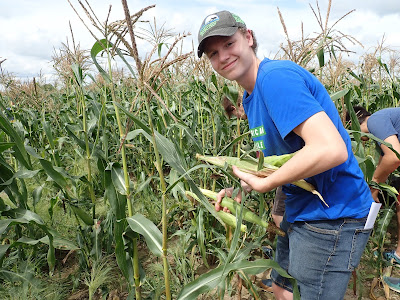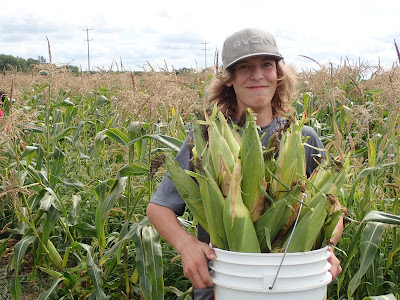On September 26th Norwell’s LEAF program set off to Re-Root Organic Farm just outside of Harriston to visit farmer Caitlin Hall. To start the morning off she talked about her 70 acre farm with 5 acres of the 70 being an organic market garden. We then learned that Caitlin sells poultry, beef, lamb and sometimes turkeys. Caitlin then told us that she has been a successful organic farmer for 14 years and plans for many more in the future. We were then taken over to get a better look at her greenhouse where she dries all of her fruits and vegetables on racks. She then took us over to her plant row covers where she told us they are used to protect the plants from different insects and diseases throughout the growing period. Next we were shown a small flower garden, cows, lambs, chickens. She also had a donkey used for protection of her animals which made itself very well known when we walked past. After that we helped pick the last of the squash for the season and then brought them to the greenhouse for drying. LEAF students can benefit from learning about this farm as we see the process of how everything is done on a farm from the fruits and vegetables being picked then dried and also how they are seeded and sold. We also learned about her animals and the process of how she raises them and feeds them with organic feed. All of her products are sold in her on farm store to local customers like us. My personal favourite part of the trip would be when we were walking out to see the flower garden and the donkey was walking beside us and started making its predator call giving everyone a good giggle for the day. The Norwell LEAF program would like to thank Caitlin Hall for letting us come to the Re- Root Farm and taking the time and help us learning about local organic farming. Cassandra K
Thursday, September 27, 2018
Hawthorn Farm Organic Seeds
Norwell LEAF students enjoyed another amazing day at Hawthorn Seeds outside Palmerston on
September 25 2018. We learned the difference and regulations between organic seed growing and
conventional seed growing. Seeds are germinated and tested all year round to insure quality for the
customers.We enjoyed having a tour of the farm and an overview of what all goes on to produce the
seeds and to pack them so they can be shipped all across Canada. We were taken to one of the
small fields and learned that all of their crops are in lone plots for increased soil health and limit
disease hitting one section of the field. The organic corn they grow for seed is planted a few weeks
earlier then their neighbors conventional, synthetic fertilized corn so that the organic corn matures
and fertilizes itself before the conventional corn does. LEAF had an amazing morning here and we
would like to thank them for welcoming us onto their farm. Nina H.
Friday, September 21, 2018
Harwill Farm
On Friday September 21, Norwell LEAF students had the opportunity to visit Harwill Farms, owned and operated by Luke Hartung and his wife Crystal. Both of them work off the farm at different jobs with Luke being the local Agronomist at North Wellington Co-op, and Crystal working at Listowel and Palmerston hospital’s. Harwill Farms is a cash crop as well as market garden that uses the CSA program meaning, Community Shared Agriculture on their 1 acre market garden as well as 3 acres of 7 different varieties of pumpkins. Luke and his wife carry a wide variety of vegetables spanning from carrots, swish chard, all the way to kale, for a grand total of 40 or so. Luke has an extensive knowledge of agriculture in soil and plant production and knows what plants need to be prosperous and it showed off this year with his excellent production of fruits and vegetables. It was sunny and dry in the month of July and he could use his irrigation system to water the plants when they needed it. Luke says “every successful season starts with a good plan” and he is right. Luke taught the LEAF students methods to weeding in all areas and situations and to have the most success you need to have the right tools. Luke took the LEAF students into the top level of their barn where he had skids and boxes full of pumpkins and squash and showed us the proper way to dry garlic. Luke was kind enough to allow each LEAF student to take home one pumpkin from his pumpkin patch since it was an incredible year for pumpkins and he had so many. Luke also touched upon crop diseases that impact the grading of the plants with diseases like Downy Mildew and Gibberella ear rot. Luke has helped LEAF students from the beginning to further our knowledge on plants and soil and many other parts of agriculture. For this we are very thankful for his time, effort, and knowledge. We would like to thank Harwill Farms for allowing us to visit their farm and market garden and sharing their knowledge with us. We would like to wish them all the best in the future. Ian J
Terraverde Farm
September 19, LEAF went to Terraverde Homestead. The owners of the farm Rob and Lorraine showed us their market garden and perennial fruit & nut tree farm. They have 10 acres of land in Northern Wellington County. Here it is windy and has a high elevation compared to most other parts of the country. They grow 40 different veggies, nut and fruit trees, along with raising chickens, geese, guinea fowl and kune kune pigs. They introduced us to natural windbreaks with their trees. They told us that the average forest would have around 20-30% organic matter and most farms would have 2-4% organic matter in the soil. Terraverde has about 6% organic matter. We learned that drip lines are used to keep plants irrigated and healthy during hot and dry summers. LEAF students can benefit from this visit by knowing you don’t need tons of land to grow a market garden business. My favorite thing about our trip was seeing the kune kune pigs. They were very cute and funny.Thank you Rob and Lorraine for letting our class visit your farm and taking you time even though you are very busy..
Monday, September 17, 2018
Pronk Farm - Organic Dairy and Eggs
On Friday September 14, the LEAF class at Norwell DSS went to the Pronk organic dairy and chicken farm. First we went to the chicken farm where we picked eggs, and learned about their egg production facility. They have 500 hens and 8 roosters that are 100 percent organic. They average about 450 eggs a day. They let the chickens outside on a 1 acre pasture everyday in the afternoon to allow the chickens to lay their eggs in the barn. The hens are fed mixed grains, flax, and in the winter alfalfa pellets because they don’t have access to grass. Next, we went to the home farm where the dairy operation is. The Pronk's milk 40 cows in a double 4 parlour. They average at about 18 litres per cow a day and gets $0.70 /L plus $0.38 for being organic and another $0.10 - $0.14 for having grass fed cows. After cows have been milked they are given hay and then let back outside on pasture until the next milking. It was a good learning experience for everyone in the class, we enjoyed learning about how they run there and very thankful that they were willing to teach us more about agriculture. Jaclyn E & Karlyn K
Friday, September 14, 2018
Outdoor Farm Show
"Canada's Outdoor Farm Show is the place to be when you want to see the new technology in agriculture. I learned a lot while visiting the COFS. I did not know how serious soil erosion really was until I saw all of the different technology to reduce it, like strip tillage. Also, the need for keeping your soil healthy by reducing compaction was interesting to learn about. I found the Dekalb tent most interesting with all of the different varieties of seed and how to make the most out of droughts and wet soils. When I spoke with General Seed I learned that having lower cobbs on silage corn stalks allows the plant to be healthier and soak up more nutrients. When visiting the show it made me want to learn more since whatever happens in agriculture will affect people's food in a good or bad way. Information on crops and soil is vital info and I find myself always wanting to learn more on why plants grow and how to improve and stop any issues that would occur in crops and soil. I was very impressed and can't wait to go again next year to learn more." Ian J.
Tuesday, September 11, 2018
Holzworth Farm - Cattle & Corn
On Thursday, September 6, the LEAF program went to the Holzworth Sweet Corn Farm just outside of Palmerston. When we got to the farm Mike showed us their cows. There were red angus/simmental cross. The meat is very tender and has a high level of marbling. Mike also mentioned that he has a donkey on the farm. It was given to him as his neighbours had no use for it. Mike now uses it to protect his cows from animals such as coyotes. We next took a wagon over to look at the different crops and to talk about soil. We learned about nitrogen fixing crops like beans, clover, peas and alfalfa. He mentioned he has some organic crops which is the fastest growing sector in agriculture. He said that he has been farming some of his land organically for 8 years. He explains how organic crops yield less, but can be more valuable. We took another wagon ride across the farm to talk to Luke, one of the neighbouring farmers, to talk about the soil. He started by taking a nitrogen fixing plant from the ground and showing us the group the nodules found on the roots and explained how they are used to lock in nitrogen. He then talked about how soil testing. He starts by handing us a sheet which documents two types of soils. He told us how soil testing should be done every three years and how important it is now that phosphorus levels are being strictly monitored in Ontario due to algae blooms in Lake Erie. He emphasizes how organic matter is very good for the soil - 3% at least. Finally, we ride the wagon over to the sweet corn crops. There is over 7 acres of sweet corn at Mike’s farm. He tells us how this corn is distributed to three local grocery stores and is sold at his own farm. He explains that sweet corn takes 65-81 days to fully mature, which can vary based on the weather and how he likes to plant each week rather than planting everything at once. Finally, we split off into two groups to pick corn to place in giant baskets given to Mike by Reapers Of Hope which sends food to poor countries. We ended our trip with a bag of corn given to us by the farm which we cooked the next day. Thank Mike. Luca & Brooklyn
Subscribe to:
Posts (Atom)







































